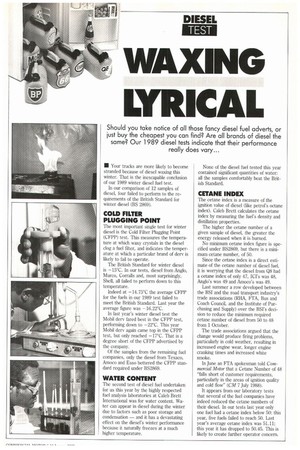WAXING LYRICAL
Page 29

If you've noticed an error in this article please click here to report it so we can fix it.
Should you take notice of all those fancy diesel fuel adverts, or just buy the cheapest you can find? Are all brands of diesel the same? Our 1989 diesel tests indicate that their performance really does vary...
11 Your trucks are more Likely to become stranded because of diesel waxing this winter. That is the inescapable conclusion of our 1989 winter diesel fuel test.
In our comparison of 12 samples of diesel, four failed to perform to the requirements of the British Standard for winter diesel (BS 2869).
COLD FILTER PLUGGING POINT
The most important single test for winter diesel is the Cold Filter Plugging Point (CFPP) test. This measures the temperature at which waxy crystals in the diesel clog a fuel filter, and indicates the temperature at which a particular brand of dery is likely to fail to operate.
The British Standard for winter diesel is —15°C. In our tests, diesel from Anglo, Murco, CerraIls and, most surprisingly, Shell, all failed to perform down to this temperature.
Indeed at —14.75°C the average CFPP for the fuels in our 1989 test failed to meet the British Standard. Last year the average figure was —16.22°C.
In last year's winter diesel test the Mobil dery fared best in the CFPP test, performing down to —22°C. This year Mobil dery again came top in the CFPP test, but only reached —17°C. That is a degree short of the CFPP advertised by the company.
Of the samples from the remaining fuel companies, only the diesel from Texaco, Amoco and Esso bettered the CFPP standard required under BS2869.
WATER CONTENT
The second test of diesel fuel undertaken for us this year by the highly respected fuel analysis laboratories at Caleb Brett International was for water content. Water can appear in diesel during the winter due to factors such as poor storage and condensation — and it has a devastating effect on the diesel's winter performance because it naturally freezes at a much higher temperature. None of the diesel fuel tested this year contained significant quantities of water: all the samples comfortably beat the British Standard.
CETANE INDEX
The cetane index is a measure of the ignition value of diesel (like petrol's octane index). Caleb Brett calculates the cetane index by measuring the fuel's density and distillation properties.
The higher the cetane number of a given sample of diesel, the greater the energy released when it is burned.
No minimum cetane index figure is specified under BS2869, but there is a minimum cetane number, of 50.
Since the cetane index is a direct estimate of the cetane number of diesel fuel, it is worrying that the diesel from Q8 had a cetane index of only 47, ICI's was 48, Anglo's was 49 and Amoco's was 49.
Last summer a row developed between the 1351 and the road transport industry's trade associations (RHA, PTA, Bus and Coach Council, and the Institute of Purchasing and Supply) over the BSI's decision to reduce the minimum required cetane number of diesel from 50 to 48 from 1 October.
The trade associations argued that the change would produce firing problems, particularly in cold weather, resulting in increased engine wear, longer engine cranking times and increased white smoke.
In June an FTA spokesman told Commercial Motor that a Cetane Number of 48 "falls short of customer requirements, particularly in the areas of ignition quality and cold flow" (CM 7 July 1988).
It appears from our laboratory tests that several of the fuel companies have indeed reduced the cetane numbers of their diesel. In our tests last year only one fuel had a cetane index below 50: this year, five fuels failed to reach 50. Last year's average cetane index was 51.11; this year it has dropped to 50.45. This is likely to create further operator concern.
















































































